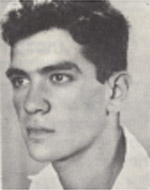Engelmayer, Jacob
Son of Yechiel and Rivka. He was born on December 8, 1936 in the city of Borislav, Poland. He was three years old when World War II broke out; On the fifth birthday, his father was taken to forced labor and the following year his mother fell into the hands of the enemy. Years of hunger and terror passed over the child. He knew ghetto life, hiding and escape, but under the protection and supervision of his uncle. At the end of the war he was nine years old, and then he was relieved. He did not see his mother again; she was tossed from one concentration camp to another and finally killed by the Germans; But the father, who passed through several camps, was liberated by the Americans in 1945, during the transport to Dachau, and after searching he found his son. Then the boy began his regular school studies and excelled at them – as he walked toward a new life. Not long afterwards, in 1949, the father and son immigrated to Eretz Israel and the boy was among a group that gathered at the children’s home in Le-Chaux, France, and found Kibbutz Mizra. As soon as he entered the educational institution, he was absorbed in the children’s society, and slowly he was introduced to some of his good qualities. He was pleasant, ready to help a tired and failed friend, and with all the seriousness that surrounded his growing adolescent personality, he also knew how to be a partner to the boys’ tricks and to their duty. He was successful in his studies in school until he was finished in 12th grade because he was gifted with common sense and common sense, and he also enjoyed chess, his favorite game among other hobbies (such as ping-pong and basketball) In the course of his time he became a central figure in the group and served as a model for all the rest in both studies and work, and during his last year in the institution he accepted the training role of the Arava group and succeeded in arousing A spirit of both education and pioneering among the young society, out of joy of life and creativity. Concentration: “Adherence to the mission” – this was a great rule in his life before he learned the principles of combat in the army and with self-confidence and firmness without giving up he would do everything he was given. When he asked his aunt to dissuade him from volunteering for this corps, after all that he had experienced in his life and being the sole son of his father, he replied: “If I do not go, and other members of our own who are fateful, who Will you? ” During his service, he would visit the kibbutz occasionally, and his visits would be good for the members. On March 6, 1956, he fell in the Battle of Qalqiliya and was brought to eternal rest in his kibbutz. The booklet, “Yankele and Shmuelik” (published by Kibbutz Mizra), is dedicated to him and his friend Shmuel Gross, whose memory was included in the pamphlet Tevet 5717 of “Pages”. His memory was also mentioned in the book “Wars of the Paratroopers” by Uri Milstein.
